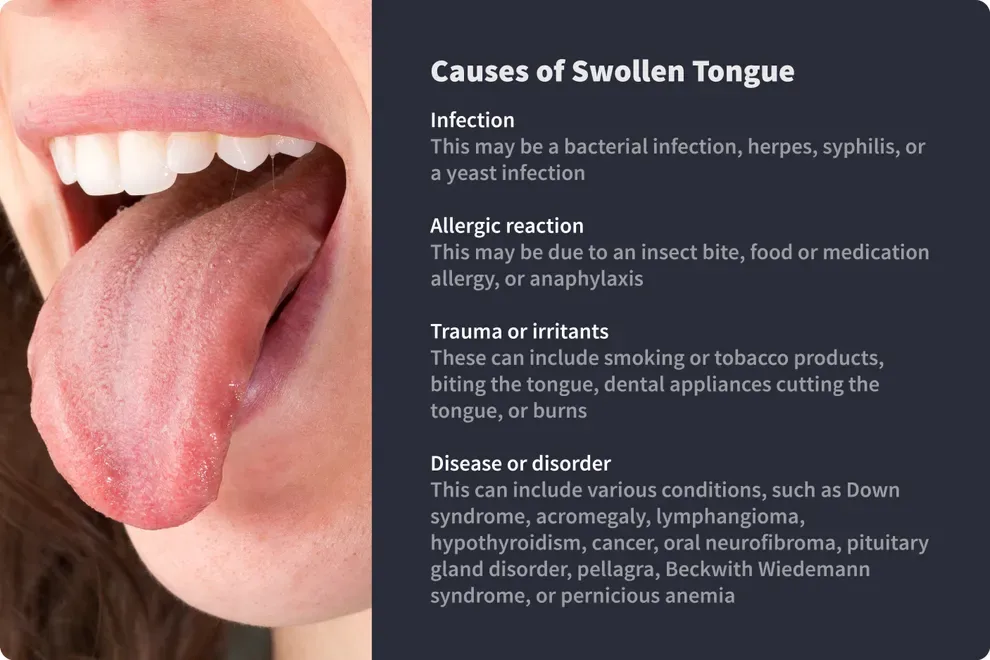Swollen Tongue: Common & Serious Causes & Treatment

Table of Contents
- Causes
- Symptoms
- Medical Emergency
- Treatment Methods
- Prevention
- References
Your tongue can swell up for a variety of reasons, including if it gets injured, in response to infection or an environmental irritant, or as an allergic reaction. Swelling of your tongue can make it harder to eat and talk normally. In extreme cases, it can make it more difficult to breathe.
A severe allergic reaction or acute swelling of the tongue can become a medical emergency and require prompt professional treatment. Less significant swelling of the tongue can often be treated at home with cold packs, antihistamines, and anti-inflammatory medications.
Preventing your tongue from swelling often means knowing what caused the reaction and avoiding it in the future.

Causes for a Swollen Tongue
A swollen tongue can be minor and the result of a small injury, such as a cut on the tongue. Or, it can be more significant, such as if it is the result of an allergic reaction, infection, or underlying disease. It is important to know what the cause of your swollen tongue is to better treat it and keep it from becoming a life-threatening condition.
These are common causes of a swollen tongue:
This may be a bacterial infection, herpes, syphilis, or a yeast infection.
This may be due to an insect bite, food or medication allergy, or anaphylaxis.
These can include smoking or tobacco products, biting the tongue, dental appliances cutting the tongue, or burns.
This can include various conditions, such as Down syndrome, acromegaly, lymphangioma, hypothyroidism, cancer, oral neurofibroma, pituitary gland disorder, pellagra, Beckwith Wiedemann syndrome, or pernicious anemia.
A reaction to a medication, such as an ACE inhibitor, is one of the more common causes of a swollen tongue. These medications are used to control blood pressure. They can cause the lips, face, and tongue to swell up quickly in a condition called angioneurotic edema. This can happen the first time you use the medication or years down the line after you have been taking it regularly.
An ongoing swollen tongue over a long period of time can be associated to acromegaly, sarcoma, oral cancer, or Down syndrome.
Symptoms of a Swollen Tongue
The tongue can swell slowly as the result of an underlying condition, or it can swell up quickly and become an acute issue. When your tongue is swollen, it can be difficult to talk normally, or swallow or chew correctly. You may also have tongue pain.
Depending on the cause of your swollen tongue, you may have other symptoms that accompany the swelling, such as these:
Ulcers
Headache
Fever
Changes in the texture of your tongue
Flu-like symptoms
Fatigue
Swelling in the face
Tongue color changes
A burning sensation
Mouth pain or sensitivity
When a Swollen Tongue Is a Medical Emergency
If your tongue swells suddenly, makes it hard to breathe, and/or you are experiencing an anaphylactic reaction, this can become life-threatening and requires immediate medical attention. These are signs of anaphylaxis:
Hives
Trouble breathing and respiratory distress
Swollen tongue
Itching
One of the most common causes of a swollen tongue due to an allergic reaction is hypersensitivity to medications or food. Acute tongue swelling can block your airway and make it difficult to breathe, which can become a life-threatening emergency.
Some of the most common symptoms of a serious swollen tongue include problems speaking and swallowing. A sudden or acute swollen tongue is a medical emergency.
Chronic or unexplained swelling of the tongue should also be checked by a medical professional, as it can be the sign of an underlying condition that is causing the swollen tongue. Treating the condition will usually help to reduce the swelling in the tongue.
Treatment Methods
Identifying the cause of a swollen tongue will dictate the treatment method. For example, a minor cut or injury to the tongue can be treated with the following:
Over-the-counter anti-inflammatory medications
Gargling with a warm saltwater rinse
Sucking on ice chips
Ice packs on the face
Avoiding alcohol, tobacco products, and spicy foods
If an infection is the cause of a swollen tongue, medications like antibiotics, antifungals, or corticosteroids may be needed to clear it up.
More serious conditions can require additional treatment methods for the underlying cause or lifesaving techniques to clear the airway so you can breathe properly.
Preventing a Swollen Tongue
To prevent your tongue from swelling up, pay attention to how and what you eat and put in your mouth. You can prevent issues by avoiding any foods you are sensitive to. Call your doctor immediately if you experience a reaction to any prescribed medication. Refrain from using tobacco products, and stick to a balanced diet.
Practicing good oral hygiene, including brushing your tongue carefully, can help to prevent many issues in the mouth. Use a soft-bristled toothbrush and brush twice a day with a fluoride and non-abrasive toothpaste.
If you have dental appliances, make sure they do not have any sharp edges or wires that irritate your tongue. If they do, have your orthodontist adjust them to keep them from cutting your tongue. You can use dental wax in the meantime.
Many times, a swollen tongue is due to a disease or condition, which can be congenital, genetic, or the result of other factors out of your control. It can help to stick to a healthy lifestyle by exercising regularly, lowering stress, minimizing environmental irritants, eating nutritious foods, drinking enough water, and getting enough sleep.
Regular visits to your doctor and dentist can help to catch oral and medical issues before they progress as well.
